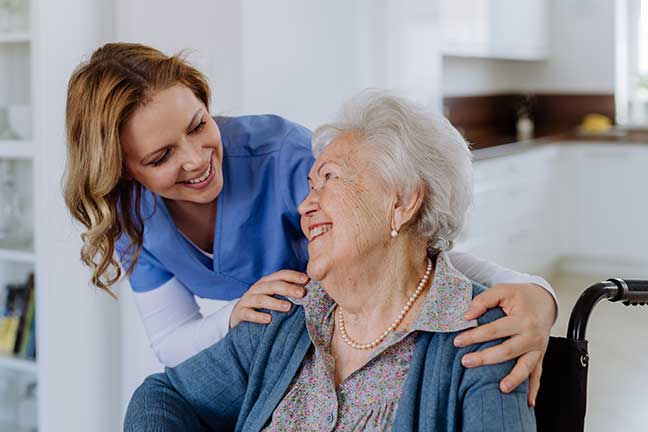Caregivers support the well-being of people facing health or age-related issues. A person may become a caregiver to take care of a sick parent, spouse, or other family member. While caregivers are often passionate about attending to their caregiving duties, fulfilling their role does come with challenges.
Oklahoma recognizes the hard work of caregivers by offering various types of support and resources. This article explores the range of assistance available to caregivers in Oklahoma, including financial aid, educational resources, and healthcare support.
Financial Assistance
Caregiving can place a significant financial burden on a person. Due to the demands of their role, many caregivers reduce their work hours or leave their jobs entirely, resulting in a loss of income. Some may even tap into their savings, which can put their financial goals in jeopardy. Oklahoma has several programs and policies in place to address these hardships faced by caregivers.
Oklahoma Lifespan Respite Voucher Program
The Lifespan Respite Voucher Program in Oklahoma aims to ease the financial strain on caregivers by giving them vouchers to pay for respite care services. Respite care offers temporary relief to caregivers by allowing them to take a break and attend to personal needs. Meanwhile, their loved one will receive care from a qualified respite worker.
Time to attend to their own needs can also have a positive impact on a caregiver’s mental health, allowing them to better perform their caregiving duties. Taking advantage of this program can be a win-win for both caregivers and their loved ones.
Caring for Caregivers Tax Credit
The Caring for Caregivers Tax Credit gives Oklahoma family caregivers a well-deserved break when tax season rolls around. The credit helps offset expenses paid by those who take care of an older relative, including health care equipment and adult day care.
To qualify, individuals must take care of a family member who is at least 62 years old and requires help with at least two activities of daily living. The care recipient must also live in a private residence. The credit can be up to $2000, but this limit is increased to $3000 for caregivers who take care of a veteran or person with dementia
Supplemental Nutrition Assistance Program (SNAP)
Caregivers facing financial challenges can benefit from SNAP, a federally funded program that helps low-income individuals and families afford nutritious groceries. This assistance extends to caregivers who may need extra funds to maintain a healthy diet for themselves and their care recipients.
The ADvantage Program
If a care recipient is enrolled in Medicaid, they may qualify for the ADvantage Program waiver. This Medicaid waiver is intended to help seniors remain in their homes and out of care facilities as they reach the end of their lives.
One option available under the ADvantage waiver is Consumer-Directed Personal Assistance Support & Services, also known as CDPASS. Through CDPASS, an elderly Medicaid participant may choose a family member or other loved one to serve as a personal care provider. This person may then receive compensation for performing their caregiving duties. To find out more about whether you are eligible to provide personal care services through CDPASS, contact the Oklahoma Department of Human Services.

Educational Resources and Training
When a loved one is no longer able to take care of themselves, those around them may find themselves thrust into a caregiving role without much training or preparation. Luckily, there are programs in place to help family caregivers learn how to properly perform their duties.
Oklahoma Caregiver Coalition
Since 2016, the Oklahoma Caregiver Coalition has served as a valuable resource for caregivers seeking education and training opportunities. Workshops, webinars, and support groups give caregivers knowledge and skills to assist them with caregiving effectively.
Family Caregiver University
Family Caregiver University, offered by the University of Oklahoma Health Sciences Center, provides educational resources and training programs for caregivers. Courses cover topics such as healthcare management, legal considerations, and self-care strategies, empowering caregivers to go above and beyond in fulfilling their role.

Healthcare Support
Caregivers might need healthcare support to help with administering medications, performing daily tasks, and keeping track of a care recipient’s health. Healthcare professionals can also give caregivers guidance on handling health issues, making it easier for them to take care of their loved ones.
Oklahoma Health Care Authority (OHCA)
The Oklahoma Health Care Authority administers Medicaid programs in Oklahoma, offering healthcare coverage to eligible individuals, including those with limited income. Caregivers can explore Medicaid options for their care recipients, ensuring access to essential healthcare services.
Oklahoma Aging Services Division
As a person gets older, the activities of daily living can become more and more difficult. The Aging Services Division provides information and assistance to caregivers of older adults. Caregivers can access resources related to healthcare, long-term care planning, and support services designed to improve the quality of life for seniors and their caregivers.
State Plan Personal Care (SPPC)
The State Plan Personal Care in Oklahoma is a Medicaid program that helps people stay in their homes by offering in-home personal care services. These services include help with daily activities like bathing and meal preparation.
If you are struggling to care for an aging or sick loved one, SPPC can help make caregiving more manageable by lifting some responsibilities from your shoulders. To find out if your care recipient qualifies or to learn more about the services covered, you can contact the Oklahoma Health Care Authority.
Legal and Advocacy Support
Caregivers might need legal help, like getting permission to manage finances or make healthcare decisions for a care recipient. They should also know about laws like the Family and Medical Leave Act (FMLA) if they are taking time off work to care for someone. Talking to a lawyer with experience in elder law can provide caregivers and their families with a sense of security as they navigate legal issues related to caregiving.
Oklahoma Lawyers for America’s Heroes (OLA)
Oklahoma Lawyers for America’s Heroes provides free legal services to qualified veterans to help them address legal issues related to caregiving responsibilities. This resource is particularly valuable for veterans and their caregivers who are facing legal challenges or seeking guidance on matters like guardianship and advanced directives.

Community-Based Support
Caregivers may need community support to manage emotional stress and meet their own personal needs. Communities can help by giving caregivers breaks, connecting them with helpful information, and providing practical assistance. Being part of a community also means caregivers can make friends, reduce loneliness, and practice self-care.
AARP Oklahoma
AARP offers advocacy and support for caregivers through its Oklahoma chapter. Caregivers can access information on legal rights, policy initiatives, and community resources to ensure they can perform their caregiving duties to the best of their abilities.
Local Area Agencies on Aging (AAAs)
Oklahoma has several AAAs that serve as community hubs for aging-related services. Caregivers can connect with their local AAA to access information on support groups, transportation services, and community resources.
Oklahoma 2-1-1
The 2-1-1 helpline in Oklahoma serves as a centralized information and referral service. Caregivers can dial 2-1-1 to connect with a specialist who can provide information on available assistance programs, support services, and community resources.
Caregivers face a range of challenges, and the state recognizes the importance of providing comprehensive assistance to support them in their vital roles. From financial aid programs to community-based support, caregivers have access to a diverse array of Oklahoma caregiver assistance. By navigating and utilizing these programs, caregivers can fulfill their responsibilities without sacrificing their financial security or mental health.
With so much on their plate, the last thing a caregiver should have to worry about is paying for monthly phone service. If you are a caregiver and could use affordable cell phone service, EASY Wireless may be able to help. They help low-income individuals who qualify for government programs like Lifeline and the Affordable Connectivity Program access affordable phone service.
To get started, you can apply online through the EASY Wireless website. Or, you can come to one of EASY Wireless’s retail stores, where a customer service agent will help you apply for benefits depending on your unique situation.


